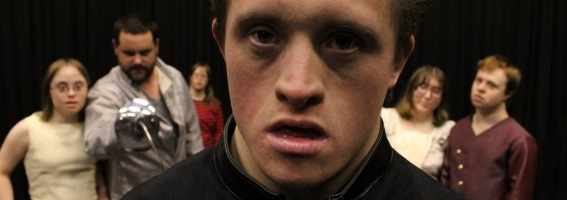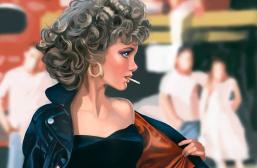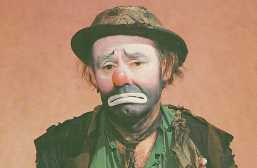Disability and the Theatre: What can Inclusive Companies Offer to the Mainstream?

Whilst at university, I attended some ironically solemn lectures about the importance of ‘fun’ in the theatre. I would sit in a sea of stern faces and learn how to play and enjoy myself on stage. I would take notes. I would nod with understanding. And when faced with an audience, I would make my lecturer despair at my restraint.
You see, fun is a serious business. Having fun in drama involves taking a make-up remover to the war-paint you wear: War-paint that consists, not of woad and semen, a lá Keira Knightly in King Arthur, but of conditioned behaviours and inherent social rules. Play-acting entails taking these behaviours that protect you from ridicule and wiping them all off. Practitioners are left bare-faced; a raw human that is driven by impulse. Having fun and following instinct in front of an audience can feel just like walking outside without make-up: There is a fear of being perceived as crude and ugly.
It is tempting to shield our true selves from view by performing the plays that we ‘ought to’, rather than the plays we want to. Companies end up taking an overtly political stance, or creating guilt-ridden in-yer-face drama. A night out at the theatre becomes more than entertainment. It becomes a test of morals, political stance and ethics for both audience and performers alike. But there are some companies that can take the goriest of tragedies and perform it with sheer joy and openness. Inclusive theatre companies, such as Blue Apple and Spare Tyre, consist of actors with learning and physical difficulties. Despite being charitable projects, some of these companies are successful enough to allow the actors to work full-time. But even when the actors’ livelihoods are ingrained in the success of the company, the emphasis is placed on having fun rather than being important or political.
If you compare inclusive theatre to mainstream, this focus on having a good time can seem to yield unpolished performances: Shows often lack pace; props are left on stage; lines are forgotten. Some of the actors may find it difficult to emote convincingly and people with learning difficulties often have trouble with enunciation.Yet these things, which would be devastating in mainstream theatre, are the very aspects that make inclusive theatre endearing and enjoyable.
Last year, I saw Blue Apple Theatre perform Hamlet. Overall, the production concept was simple (an art deco floor design and costumes without specific era, yet hints of Shakespearean in the tailoring.) Tommy Jessop, who played Hamlet, did not focus on the internal turmoil and highly emotive aspects of Hamlet. He performed in between smiling at the audience, pausing melodramatically for applause and pumping the air with his fist when he completed a speech. Yet it is because of all this that Tommy’s depiction of Hamlet was fun, honest and absolutely brilliant. He delivered the line “Then, am I revenged?” in such a frank way that showed tender tones of confusion and uncertainty – and this was heightened by your awareness of his disability. The play was successful because rather than apologising for melodramatic traits, they built the idiosyncrasies of the actors into the performance.
Spare Tyre theatre worked in a very similar manner with their showcase, I’m an Artist, Let Me In! In one episode, performer Bob Quinton delivered a speech from a Shakespeare tragedy in incomprehensible English due to a speech difficulty. His words were subtitled on the wall behind, and dramatic effects were employed such as a long speech resulting in a short subtitle. The result was intentionally comic and the audience laughed as Quinton smiled. There was nothing overtly political in what was said or read. Yet the juxtaposition of Quinton’s speech and the subtitles highlights a social and political issue from the actor’s everyday life. Spare Tyre chose fun and comedy to present their view of tragedy.
If you compare these performances to the current RSC version of Hamlet, it is clear there is an entirely different focus. RSC’s production involves a convoluted concept set in a gymnasium, costumes which have been likened to ‘bureaucrats’ and characterisation that encapsulates all emotions. An audience expects a certain type of performance from the RSC – and a certain amount of seriousness – and the RSC tries to meet these expectations by being original and challenging. Yet this production has been criticised by some. Clare Brennan for the Observer called it “an infuriating mix-up of self-regarding concepts and sharp ideas.” In striving to create the ultimate tragedy, they seem to have been lured into trying too hard to be meaningful.
Whilst there is obvious merit in original production concepts and in-depth psychological characterisation, should such aspects take precedence over audience enjoyment? Companies forget that they actually have a fun job and they are supposed to be enjoying themselves, as well as making the audience enjoy themselves! They could do with taking a look at the performers from inclusive theatre companies, who talk about and actively show the fun they have when performing.
Blue Apple and Spare Tyre may not necessarily present challenging concepts through their choice of work or the way they present them. Yet every time an actor with a disability steps onto a mainstream stage they are making a political statement. By focusing on the performers rather than the design, it suggests that they are not forcing any political, moral or social statements onto the audience, yet it highlights the trust the director and designers have in these performers. So often such performers are relegated to the lesser parts. In the past, they would have been confined to freak shows. So to see them on mainstream stages stretches an audiences’ perception of talent. They are barefaced, impulsive and full of integrity. But perhaps most importantly, they are having fun and that encourages an audience to do the same.
What do you think? Leave a comment.











Thank you for sharing this. I would be really interested to attend on of their performances.
Fantastic! Thank you for reading 🙂
Respectfully, like you say, previously we may have had the picture that their performance were confined to freak shows but this has changed, a lot – and I am very glad that it has. Good article bringing awareness to something beautiful.
Thank you 🙂 glad you like it.
Great article! I don’t really think I’ve ever read an article about this kind of theater.
Yay, i was hoping I would be able to share new things with a few people 🙂 thanks!
This is an interesting piece and well written but I wonder if you’ve taken on too much for a short article. I have to say I disagree with your assertion that ‘having fun in drama…entails taking…behaviours and wiping them all off’ and that ‘Practitioners are left bare-faced’. This is not really how I understand acting and I’m not sure that the theatre is all about ‘having fun’. That said your choice of subject matter makes compelling reading and I was very interested to read about Blue Apple and Spare Tyre theatre groups with whom I was previously unfamiliar; I loved the story about the performer Bob Quinton. It’s also good to see someone writing engaging work on drama and the theatre, particularly on less mainstream subjects and I hope to contribute something myself shortly. Are you familiar with the work of Dorothy Heathcote and Gavin Bolton who have done outstanding work on Theatre in Education? I think you would get something from them – please forgive me if I’m teaching my Grandmother to suck eggs here! Keep up the good work!
Thank you for the feedback. I’m glad I could introduce you to Blue Apple and Spare Tyre. I don’t know Heathcote and Bolton off the top of my head, but I remember doing a bit about Theatre in Education when I was studying, I shall have to look them up.
When I talk about ‘taking behaviours and wiping them off, leaving the practitioner barefaced’, it is more a reference to letting go of things like arrogance, insecurities and personal attributes which we have acquired as a kind of ‘social character.’ In order to find the character in the play, an actor cannot be concerned with how their friends or audience will perceive THEM as a person – it is the character that should be seen. (This is why we say the best actors ‘lose themselves’ in their character.)
I know this is a bit of a contradiction because I say Blue Apple did well BECAUSE they involve the idiosyncrasies of the actor. But in that case, involving the idiosyncrasies is a directorial decision that is feeding into the characters, not detracting from them.
And I agree, creating theatre is not ALL about having fun. But if your not enjoying yourself creating great works of art, why would you do it?
I think many artists, particularly great artists, are driven to do what they do. It’s not necessarily a choice or something that they do because they enjoy it. I’m thinking of Van Gogh, Ian Curtis, Sarah Kane just off the top of my head.
Thank you for your reply and I look forward to reading more of your work.
Haha i did think of some of those artists as I wrote that answer! I recon you’re right, some do chose art as a form of expressionism and vocalisation regardless of whether people agree and enjoy it.
Art for art’s sake! That’s us!
I absolutely agree that if more emphasis is placed on the performers having fun and less so on morals, politics and indeed money, then the audience has fun to. This is a very interesting read and I really like your writing style, it is very authoritative and intellectual. I look forward to reading more of your articles.
Oh thank you very much!
I appreciate the goals set forth by this article to introduce and applaud theater companies showcasing disabled performers, but I find your repeated assertions that they are “just having fun” and there is “nothing political” about the thesis of their performance to be a little patronizing and overly simplistic. Despite the waning acceptability of “freak shows,” the abjection and invisibility of the disabled body is still tremendously at issue. In theater this is blatantly clear in the casting of able-bodied performers in roles of disabled characters (even when a disabled actor has auditioned, as Maysoon Zayid discusses in her wonderful TED Talk here: http://www.ted.com/talks/maysoon_zayid_i_got_99_problems_palsy_is_just_one ).
The very existence of theater companies made up of people with disabilities is political, as these companies exist to provide access to performers who would otherwise struggle to find opportunities to perform within the confines of an ableist community.
Thank you for your comment. I would point out that I never use the word “just” because I outline in the opening that having fun is a crucial part of theatre.
I also conclude by saying that “every time an actor with a disability steps onto a mainstream stage they ARE making a political statement. By focusing on the performers rather than the design, it suggests that they are not forcing any political, moral or social statements onto the audience, yet it highlights the trust the director and designers have in these performers” which I think is what you are saying also?
Thank you so much for sharing this.
Thank you for reading 🙂
This is a really cool point of view – I would love to see a performance by Blue Apple or Spare Tyre. Theatre people so often get caught up in being serious and making it meaningful that they forget to “play” and actually have fun. Everyone has the capability of captivating an audience and delivering a stellar performance.
Thank you so much! There are quite a few companies out there, I only talked about the ones I know and have seen but there are a few more I know about. Hope you can catch some 🙂
The difficulty in this is that there is a significant possibility of failure in your play if the message is too obvious, even preachy.